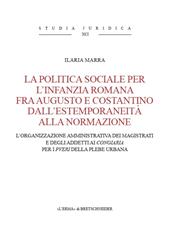La politica sociale per l'infanzia romana fra Augusto e Costantino dall'estemporaneità alla normazione : l'organizzazione amministrativa dei magistrati e degli addetti ai congiaria per i pueri della plebe urbana
155 pages : illustrations
Includes bibliographical references (pages 141-155).
Comparing heterogeneous sources allows the author to recognize how measures in favor of minors of the urban plebs were regulated by republican and imperial legislation that, at first extemporaneous, became programmatic through senatoconsults and constitutions. Augustus was the first to also 'invest' in minors under the age of 11, giving them access to grants made on the basis of censuses and with administrative matching between public lists of beneficiaries and individual records. Bas-reliefs and coins are detailed sources of knowledge of this, starting with the Ara of the Scribes, inspired by a lost Augustan monument, an iconographic model until Constantine. The congiarium was usable for food, but also for clothing, housing and education: this was the response, in keeping with Augustan 'marriage laws,' of the paternalistic system to malnutrition in order to increase the birth rate of Roman ciues to recruit them into the army.
The measures between Augustus and Trajan, in parallel with the Alimenta Italiae, concerned only the plebeians, but from the Antonine age and with Constantine also the honestiores, a sign of the widening of the 'social scissor'. The Constantinian choice of support for gold coinage, a monopoly of the potentiores, must have plunged even many of them into misery, whom in the reliefs of the Arch of Constantine we see rushing with bewildered faces, despite the dignitas of the contabulata toga, to receive imperial relief. CTh. 11.27. 1-2 acquaints us with two Constantinian constitutions intended to prevent infanticide with subsidies from the fiscus or from the prince's res priuata, but their rationale is obviously different from that of the 1st-2nd century emperors, the Constitutio Antoniniana having abolished the distinction between Romans and provincials even in the army. [Publisher's text]
-
Information
SERIES
DISCIPLINES
SUBJECTS HEADINGS
- Public welfare -- Rome
- Child welfare -- Rome
- Charities -- Rome


